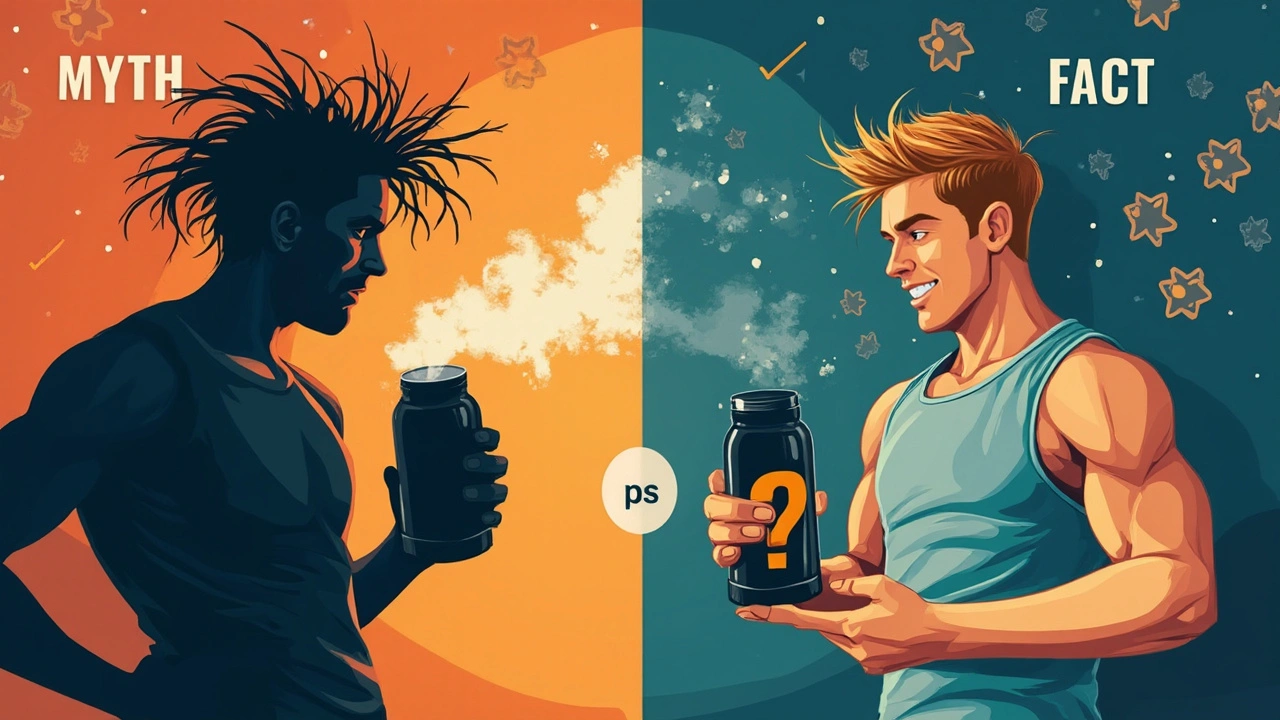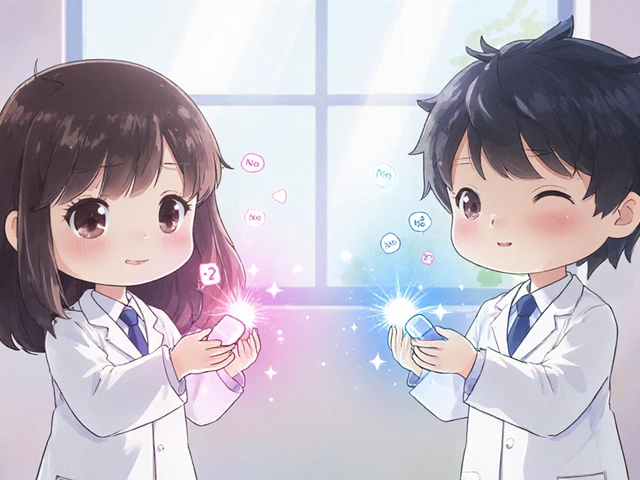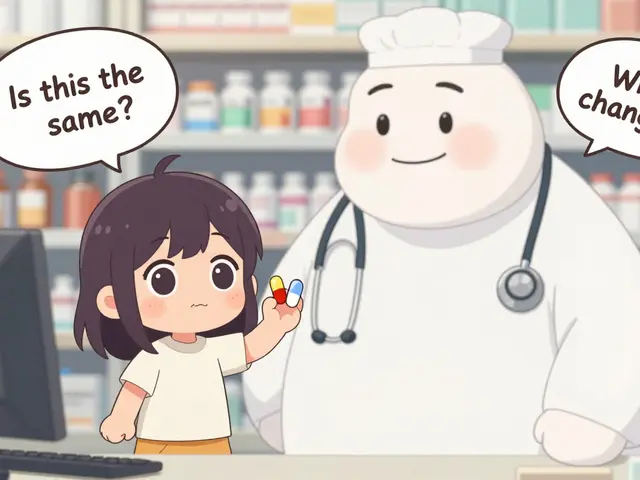Forget what you've heard on gym floors or read in anxious online forums—creatine, the darling of strength training and fitness, comes with rumors. Some people swear it gave them superhuman muscles. Others whisper about thinning hair and receding hairlines. The debate isn't just about gains vs. hair loss, though; it's about what we really know and how to use creatine responsibly. If you max out at the squat rack and start eyeing your hairbrush with dread, you're not alone. The connection between creatine supplementation and hair loss has sparked heated arguments, cautious research, and plenty of awkward bathroom mirror moments. Nobody wants to lose hair over biceps, so let's get to the bottom of what's real and what belongs in the fitness myth graveyard.
The Science Behind Creatine and Hair Loss: Sorting Fact from Folklore
You probably know creatine as one of the most-researched sports supplements on the shelves. It’s in the pre-workout stash of athletes everywhere for its muscle-boosting effects. But somewhere between bench presses and protein shakes, questions about its effect on hair follicles started popping up. Where does this idea come from? It started with a small study out of South Africa in 2009. Rugby players took creatine monohydrate (a classic, safe form) for three weeks. The study said creatine supplementation led to a spike in dihydrotestosterone (DHT), which is a breakdown product of testosterone. Here’s the important bit: Elevated DHT is a known culprit behind male pattern baldness. Quickly, headlines blared: "Creatine causes hair loss!"
But science isn’t about one-off stories. Since then, researchers have scrutinized that study and asked, "Was that spike in DHT a fluke, or a real effect?" First odd thing: The players’ DHT was measured in their blood, not at the hair follicle, which is what actually matters for baldness. Plus, follow-up research hasn’t repeated those same findings. Many well-designed studies, some tracking athletes over months or even years, showed no significant increase in DHT or change in testosterone with creatine use. Even the original study didn’t actually measure any hair loss—just blood hormone levels.
Harvard-trained dermatologist Dr. Jerry Shapiro puts it bluntly:
"In all the years of treating hair loss, I have never seen convincing evidence that creatine alone leads to balding."That’s the heartbeat of today’s scientific consensus. Any potential link seems weak, theoretical, and unproven in healthy people using regular dosages. And yet, the myth persists, in part because DHT gets all the bad publicity in hair loss discussions.
Still, if you’ve got family members who started balding before their 30th birthday, you may wonder if it’s safer to play it super-cautious. Genetics remain the number one risk factor for male and female pattern hair loss. Environmental stressors, hormone imbalances, even tight ponytails—and, yes, intense athletic training—can play a part. If you’re prone to hair thinning already, you might feel more anxious about every powder you put in your protein shaker. But the numbers don’t support widespread worry over creatine itself. After more than 20 years on the market, with millions of users, there isn’t a wave of hairless gymgoers posting before-and-after baldness selfies.
Here’s a helpful reality check: Many cases of hair loss blamed on supplements turn out to be related to other factors—stress, calorie restriction, or heavy exercise all play a much bigger role in "sports-induced hair loss" (check out this detailed dive: sports-induced hair loss). If you start losing hair, look at your sleep, your habits, your training load, and your family tree before you blame the creatine tub.

How Much Creatine is Too Much? Safe Dosages, Smart Choices
If you’re already scanning supplement labels for fine print, here’s the rundown: Creatine isn’t sneaky. It's one of the most transparent, safe, and stable supplements you can buy. The International Society of Sports Nutrition (ISSN) calls it “one of the most researched and beneficial sports supplements available.” Their standard advice: take 3-5 grams per day for maintenance, after an optional loading phase (typically 20 grams split over four daily doses for 5-7 days).
Here’s where dosage comes into play. It’s tempting to think, "More powder, more muscle," especially if you see the words “loading phase” on the back of the jar. But unless you’re a bodybuilder prepping for competition, there’s no real benefit to mega-dosing. The science says that, after your muscle stores of creatine are “saturated” during the first week, your body won’t use the extra—it’ll just get excreted. Higher doses aren’t linked with better strength, but they can lead to stomach upset or bloating. Your hair follicles are not affected by normal creatine levels, even during loading. So, while you may feel a little puffier during the first week, nothing changes with your DHT or androgen hormones long-term.
Let’s be real: Most people overthink loading and underthink hydration. When you’re upping your creatine, your muscles pull in more water. So if you suddenly feel thirsty, or you notice you’re hitting the bathroom more, adjust your water intake. Stay hydrated! This also keeps your scalp (and skin) looking healthier, hair included.
If you do notice thinning or more hair in the shower drain, track when it started. Did you just start a new diet, ramp up your workouts, or go through a stressful event? Sudden hair loss rarely has a single cause, unless you’re pulling your hair tight or dealing with certain health conditions. Dosage matters, but only for kidney health if you already have kidney problems—not for causing bald patches. And there’s no reputable evidence that tweaking your creatine dose will spare your hair if your genes are primed for androgenic alopecia.
Smart supplementing means sticking to the basics: buy a trusted brand, measure your servings, and don’t fall for “muscle-building stacks” that mix creatine with who-knows-what. Check the ingredient list. If you’re worried about hair, avoid any mix-ins with stimulants or “testosterone boosters.” These haven’t been studied the way plain creatine monohydrate has, and they can mess with your hormones more than creatine ever could.
Vegans and vegetarians might benefit most from creatine, since their diets tend to be lower in it naturally. They’ll see the biggest boost in performance, and their risk profiles for hair loss remain the same as omnivores. Women, by the way, don’t experience increased hair loss with creatine either, despite influencer fear-mongering. If you’re on birth control, pregnant, or breastfeeding, skip the supplements for now—those situations haven’t been researched enough.

Practical Tips: Keeping Your Gains—and Your Hair
Let’s say you’re still uneasy. What can you do to protect your hair while chasing your fitness goals? First, don’t rely on random internet advice that says "just stop creatine," especially if it’s helping you stay consistent at the gym. If you do have a family history of hair thinning, you may want to increase surveillance, not paranoia.
Here are some easy, science-backed steps to support healthy hair while taking creatine:
- Track changes: Snap monthly photos if you think you notice thinning. Hair loss isn’t subtle—it develops over weeks or months, not days.
- See a doctor if worried: A dermatologist can do a scalp exam and suggest blood tests to rule out other causes before blaming any supplement.
- Maintain nutrition: A lack of protein, iron, vitamin D, or healthy fats will speed up shedding way before creatine ever could.
- Manage stress: Chronic stress triggers "telogen effluvium," or rapid hair shedding. Meditation or yoga may help more than tweaking your supplement stack.
- Practice scalp care: Use mild shampoos, avoid tight hairstyles, and treat your scalp gently, especially if you sweat a lot from workouts.
- Avoid “miracle” supplement stacks: Ingredients like prohormones, anabolic steroids, and certain herbal blends are much riskier for hair health than plain creatine.
Another tip? Forget the idea of “detoxes” if you’re losing hair. Sudden stopping and starting supplements can actually shock your body more than a steady, thoughtful approach. If you feel like you can't figure out the cause, remember that genetics control about 80% of age-related hair loss. Even with perfect supplementation, most people with a strong family pattern will experience some thinning over time—creatine or not.
The thing most fitness communities ignore: hair health reflects whole-body health. If you’re sleeping enough, eating well, and not overdoing caffeine or late-night anxiety scrolling, you’ll notice better skin and healthier hair. Supplements like biotin or saw palmetto are popular for hair, but evidence for them is even weaker than the evidence against creatine. If you want solid results, stick with what’s proven: healthy lifestyle, balanced nutrition, and regular check-ins with a health professional if you see real change.
Right now, creatine is the fall guy for dozens of unrelated gym life problems. But the best creatine research keeps saying: for most healthy people, it’s not the enemy your hairline fears. Focus on your training plan, your hydration, and whole-body care. If you see unexpected changes in your hair, rule out the obvious causes before tossing your protein shaker. For most, the only thing creatine boosts is your reps—not your hair loss risk.







chuck thomas
May 24, 2025 AT 19:17When you strip away gym folklore and look at the data, the creatine‑hair loss link starts to look like a classic case of correlation versus causation. The 2009 rugby study sparked a cascade of headlines, yet subsequent trials with larger cohorts have failed to replicate a meaningful DHT surge. In practical terms, the hormone fluctuations observed were modest and measured in blood, not at the follicle where it truly matters. Most athletes who follow the standard 3‑5 g daily protocol report no discernible thinning, suggesting the myth outweighs the evidence. So, if you’re weighing the risk, the scientific balance tilts heavily toward safety.
Gareth Pugh
May 29, 2025 AT 10:24Think of it as a gym‑room urban legend-vivid, catchy, but ultimately a story we tell ourselves while waiting for the next PR.
Illiana Durbin
June 3, 2025 AT 01:31First, let’s acknowledge that hair loss is a multifactorial process, and genetics lay the foundation like a blueprint you can’t simply rewrite with a scoop of powder. Even if you have a family history of early balding, your scalp’s response to hormones hinges on receptor sensitivity, which isn’t dramatically altered by the modest DHT changes seen in most creatine studies. Second, the body’s creatine pool functions primarily in energy buffering within muscle cells; it doesn’t have a direct signaling pathway to the hair follicle’s growth cycle. Third, the loading phase-often 20 g split over four doses for a week-simply saturates muscle stores, after which excess is excreted, so any lingering systemic effect is fleeting. Fourth, the occasional anecdote of shedding after a new supplement regimen often coincides with other stressors: calorie deficits, increased training volume, or even sleep disruption, all of which are known culprits in telogen effluvium. Fifth, proper hydration, which the article wisely emphasizes, supports both muscular performance and scalp health, because dehydration can make hair shafts appear brittle. Sixth, consider the nutritional context: protein, iron, vitamin D, and omega‑3 fatty acids are the real building blocks for keratin synthesis, whereas creatine is a non‑essential amino‑acid derivative that your body can produce endogenously. Seventh, for vegans and vegetarians, supplementing creatine actually corrects a dietary shortfall without adding any new hormonal risk. Eighth, women taking hormonal contraceptives already experience stabilized androgen levels, making additional DHT fluctuations from creatine unlikely to tip the balance. Ninth, the handful of reports linking creatine to accelerated hair loss in clinical literature are either case studies with confounding variables or involve proprietary blends containing stimulants, not pure monohydrate. Tenth, the International Society of Sports Nutrition’s position statements repeatedly affirm that creatine has a robust safety profile when used at recommended dosages. Eleventh, if you do notice a change in shed volume, a systematic approach-photo tracking, scalp examination, and blood work-helps isolate the true source. Twelfth, a dermatologist can perform a trichoscopic analysis to differentiate between pattern baldness and temporary shedding. Thirteenth, stress management techniques such as mindfulness or periodized training can mitigate cortisol‑induced hair loss pathways. Fourteenth, if you remain uneasy, you can forgo the loading phase and maintain a steady 3 g daily dose, which still delivers performance gains without the brief spike in water retention. Finally, remember that the biggest predictor of future hair health is consistency in overall lifestyle-not the occasional supplement decision.
Tyler Heafner
June 7, 2025 AT 16:37From a clinical perspective, the existing peer‑reviewed literature does not demonstrate a statistically significant increase in dihydrotestosterone attributable solely to creatine monohydrate ingestion at customary dosages. Consequently, prescribing creatine as a contributory factor in androgenic alopecia would be premature without corroborating longitudinal data.
anshu vijaywergiya
June 12, 2025 AT 07:44Imagine standing under the unforgiving fluorescent lights of the gym, beads of sweat glistening, only to watch the mirror betray a receding horizon of hair-this is the very theater that fuels the myth, a drama where every clank of the barbell echoes a whispered fear of baldness.
ADam Hargrave
June 16, 2025 AT 22:51Sure, because creatine totally grows a bald spot. 🙃
Michael Daun
June 21, 2025 AT 13:57nah man creatine just helps you lift more its not magic hair spray its all about the grind
Rohit Poroli
June 26, 2025 AT 05:04While the colloquial dismissal may resonate, from a systems‑biology standpoint the anabolic signaling cascade initiated by phosphocreatine replenishment operates independently of the androgen receptor pathway that governs follicular miniaturization; thus, the mechanistic overlap is negligible, and maintaining a balanced macronutrient profile remains the primary lever for dermal resilience.